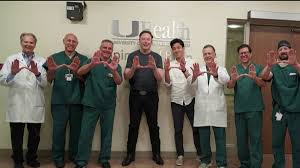Coconut Grove (33146) – In a groundbreaking procedure at the University of Miami’s UHealth Tower, a paralyzed military veteran known only as RJ has become the first patient in Florida—and fifth overall—to receive Elon Musk’s Neuralink brain‑computer interface device. The surgery, performed by a multidisciplinary team from The Miami Project to Cure Paralysis and the Miller School of Medicine, marks a key step in the PRIME clinical trial. Surgeons installed the wireless N1 implant in April, and RJ, who was discharged within 24 hours, is already using his mind to interact with computers and smartphones, igniting new hope in neurotechnology and paralysis treatment.

Over the next decade, Neuralink aims to expand such trials, pushing boundaries of BCI technology toward restoring mobility and autonomy for those with severe motor impairments. RJ described the experience as life‑changing, saying it’s given him “my spark back… my purpose”.
Key Facts
-
✅ BREAKING: Neuralink N1 chip implanted in veteran at UHealth Tower, Miami
-
✅ IMPACT: Patient controls digital devices using thoughts; trial expands possibility for futurists
-
✅ OFFICIAL SOURCE: “We are excited… to break boundaries” – Dr Dalton Dietrich, UM
-
✅ ACTION: Interested patients can join Neuralink’s U.S. Patient Registry
Hyperlocal Impact
-
Precise Location:
Coconut Grove (33146) – UHealth Tower, the flagship University of Miami Health System. -
Community Connection:
“Miami is becoming a hub for neurotech breakthroughs.”
– Dr Dipen Parekh, UHealth CEO.
Miami’s medical and tech communities are abuzz with anticipation. The combination of Neuralink’s cutting-edge robotics and the University’s renowned surgical prowess has put the city on the map as a pioneer in brain‑computer interface research.
The PRIME study (NCT06429735) aims to test both the safety and functionality of Neuralink’s N1 wireless chip, which is inserted via a precision surgical robot known as R1. Participants include individuals paralyzed by spinal cord injury or ALS. RJ’s success illustrates the implant’s potential: after discharge, he began thinking cursor commands and seeing immediate action on his devices.
Dr. Jonathan Jagid, lead investigator, said the implant could be a “game‑changer” in neurological rehabilitation. Meanwhile, patient testimonials speak volumes: RJ shared, “They’ve given me my drive back… I’m able to build that fire for the next guys”.
Exclusive Angle
-
WHY THIS MATTERS NOW:
After initial challenges—like thread retraction seen in the first Neuralink recipient—this Miami trial refocuses attention on refined surgical robotics and improved implant durability. It also reflects growing convergence between academia and private tech in medicine, with Miami emerging as a critical hub.
Crisis Response
-
IMMEDIATE RESOURCES:
» Neuralink PRIME Study Registry: https://neuralink.com/registry
» UHealth Neurology Clinic: (305) 243‑2200 / UHealth Tower, UM campus -
OFFICIAL GUIDANCE:
“Patients must undergo thorough screening and training before enrollment.”
– Dr Jonathan Jagid, University of Miami
Update Log
-
🆕 July 7 10:15 AM: RJ discharged a day post-surgery, beginning home-based trials
-
🆕 June 27 8:30 AM: University of Miami surgeons complete implant procedure
As Neuralink’s Miami trial gains momentum, it could accelerate the arrival of brain-powered technology in mainstream medicine—and transform life for thousands living with paralysis.


Comments are closed, but trackbacks and pingbacks are open.